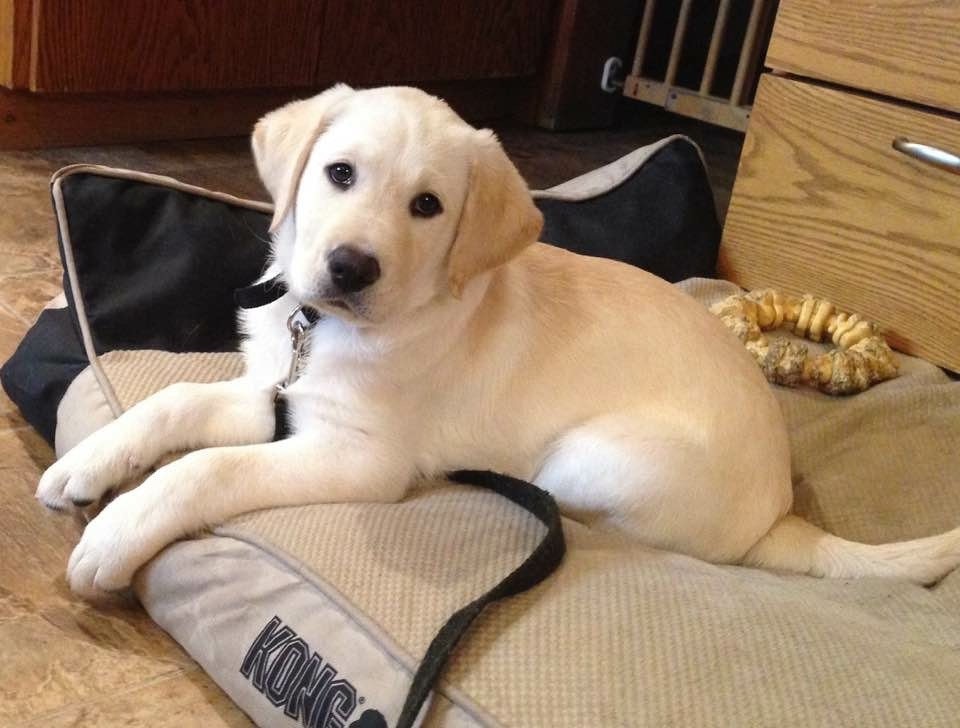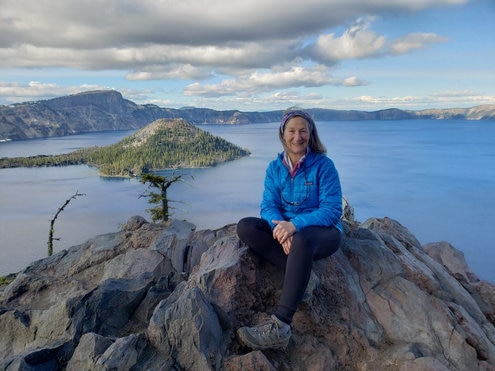Guide dog leads to friendship
For Marsha Bukala, a guide dog was the difference between isolation and independence. Fidelity Charitable donor Kathy Wentworth was able to provide support – and friendship.

In just two years, Marsha Bukala lost most of her eyesight.
First went street signs.
Then faces.
The worst day: When the doctor told her she had to give up her car keys. The degenerative condition scarring her retinas had progressed too far. It was no longer safe to drive.
“I kept thinking all I needed was a new prescription,” Bukala says. “It was hard to accept.”
As her vision blurred and darkened, Bukala had to retire early from her long career in insurance. In her twice-weekly yoga class, she could no longer match her movements to the instructor at the front of the room. Even with a cane, leaving her house alone after dark was too risky.
“It was a scary time,” Bukala says. “A lot of times, with vision loss, people get isolated – you don’t want to go out with a cane. I could give myself an excuse not to leave the house.
“I was like, I have to learn a way to manage, to be able to still be independent and do the things I need to do. I just have to learn how to do them differently.”
So she sent in her application to Guide Dogs for the Blind, a national non-profit with a training campus in Oregon.

Supercharged giving
Across the country in Portland, Oregon, Kathy Wentworth had just qualified to puppy-sit a yellow Labrador retriever named Jewel. Jewel was a puppy with a purpose: one of the dogs bred and meticulously trained by Guide Dogs for the Blind to help someone like Bukala hold on to her independence.
A retired junior high school teacher with a black lab and a dachshund of her own, Wentworth has recommended grants to the nonprofit from her Fidelity Charitable donor-advised fund for years. A donor-advised fund is like a charitable investment account, created for the sole purpose of supporting charitable organizations.
Guide Dogs for the Blind provides highly trained dogs like Jewel to qualified applicants for free – and provides veterinary financial assistance as needed. That means the nonprofit invests about $100,000 in each dog, says Theresa Stern, Vice President of Outreach, Admissions and Alumni Services.
“Because we don’t charge for any of our services, we are completely reliant on volunteerism and upon donations from private donors like Kathy,” Stern says.
Wentworth’s motivation for giving is deeply personal and tough for her to talk about. Wentworth’s 14-year-old brother was killed when she was 12. Her parents set up a college scholarship for local high school students, choosing generosity as their way to honor his memory.
Fifteen years later, tragedy struck the family again when a drunk driver killed Wentworth’s parents. Stunned and struggling to find a positive outlet for her grief, Wentworth turned to her parents’ example: philanthropic giving in her parents’ memory to nonprofits like Guide Dogs for the Blind.
Wentworth also volunteers for the nonprofit in a variety of ways, including her work as a puppy-sitter. Because a guide dog is trained to help its handler navigate potentially dangerous situations, a team of staff and trained volunteers work together to foster good habits from the start. Puppy sitters like Wentworth are charged with maintaining training consistency when the puppy’s primary raiser is out of town. That’s how Wentworth met Jewel – and, eventually, Bukala.
In 2018, Bukala flew from her home in Florida to the Guide Dogs campus in Oregon to be matched with her new co-pilot and attend two weeks of training school.
“When you get a guide dog, that’s wonderful, but it’s also not all you get,” Stern says. “You really get a whole community, a whole family, that’s with you throughout your life.”
“We were put here to help each other…”
Bukala’s introduction to Jewel felt like “being a kid on Christmas morning,” she says. At training school graduation, she got to meet and thank some of the volunteers who helped raise Jewel – including Wentworth. The women discovered a shared passion for giving back; Bukala had volunteered with the Ronald McDonald House for decades, helping children and families during times of medical need.

“We were put here to help each other – there’s so much more to life than just working,” Bukala says. “We could never have these great dogs without people like Kathy.”
“I would encourage anyone to think deeply about what they love and find a way that they can use their gifts to support it,” Wentworth says. “It’s opened my world; it’s made my world bigger.”
Now, Wentworth and Bukala text often. Both women have the same photograph displayed in their living rooms: Bukala and Jewel surrounded by some of Jewel’s Guide Dogs for the Blind volunteers on graduation day. Bukala considers them Jewel’s extended family.
Bukala has started going out regularly again: beyond yoga and the grocery store, she and Jewel have adventured to Savannah, Los Angeles, Cleveland, Seattle, Park City and Las Vegas. With Jewel by her side, Bukala is no longer afraid to walk in the dark.
“Jewel is this gift, the most incredible gift I’ve ever gotten,” she says. “I feel like she’s reopened my eyes.”
Learn how you can have a greater impact with your charitable giving. Supercharge your giving with these 9 tips.
Want more info before you open a Giving Account?
Sign up to receive occasional news, information and tips that support smarter philanthropic impact through a donor-advised fund.
How Fidelity Charitable can help
Since 1991, we have been a leader in charitable planning and giving solutions, helping donors like you support their favorite charities in smart ways.
Or call us at 800-262-6039





